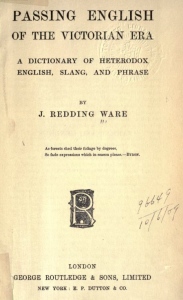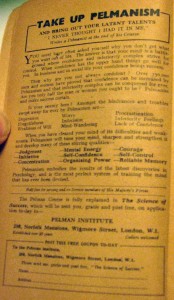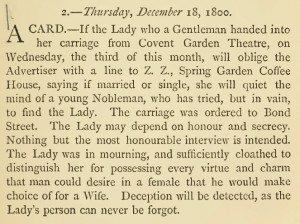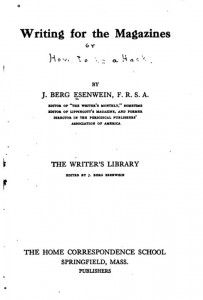Follow Scott
Recent Tweets
- Waiting for Twitter... Once Twitter is ready they will display my Tweets again.
Latest Photos
Search
Tags
anniversary Balticon birthdays Bryan Voltaggio Capclave comics Cons context-free comic book panel conventions DC Comics dreams Eating the Fantastic food garden horror Irene Vartanoff Len Wein Man v. Food Marie Severin Marvel Comics My Father my writing Nebula Awards Next restaurant obituaries old magazines Paris Review Readercon rejection slips San Diego Comic-Con Scarecrow science fiction Science Fiction Age Sharon Moody Stan Lee Stoker Awards StokerCon Superman ukulele Video Why Not Say What Happened Worldcon World Fantasy Convention World Horror Convention zombies
©2025 Scott Edelman
A few highlights from the 1909 book Passing English of the Victorian Era
Posted by: Scott
Tags:
old books
Posted date:
November 2, 2014 |
No comment
I’ve been reading J. Redding Ware’s 1909 book Passing English of the Victorian Era, a collection of words and phrases once used—some by many, some only by a few—during the period of the book’s title. It’s so fascinating, it’s hard to stop reading.
Now that I’ve made my way through the letter C, here are the ones that tickled me so far.
Acknowledge the Corn (American English)
Adroit confession of minor offence to intensify the denial of the major offence: e.g., “Sir, I believe you are after my wife—and you certainly pocketed my meerschaum last Sunday evening at 10.30.” To which the answer might be: “Well, I acknowledge the corn—I took the pipe by incident, so to speak; but as to Mrs H., I’m as innocent as the skipping lamb.” Said to arise from an ordinary horse-lifting case in the West of U.S.A. The victim was accused of stealing four horses from one point and four feeds of corn from another for the said four horses. “I acknowledge the corn,” said the sufferer—but legend says he was lynched in spite of the admission. (more…)
Take up Pelmanism and bring out your latent talents
Posted by: Scott
Tags:
old books
Posted date:
July 30, 2011 |
No comment
Pelmanism? What’s Pelmanism? Evidently, a big deal … once upon a time.
The UK paperback edition of Agatha Christie’s One, Two, Buckle My Shoe contained the following advertisement on page 8, tucked between the poem referenced in the title and the first page of novel text. (I’m sorry I couldn’t provide a clear scan of this, but I hesitate to press the inside of a ’50s paperback flat against a scanner, and so instead snapped as clear a pic as I could.)
I’m chagrined to admit that until I encountered this ad, I’d never heard of Pelmanism, which promised here to cure me of Depression, Forgetfulness, Weakness of Will, Worry, Indecision, Mind-Wandering, Procrastination, Inferiority Feelings, and Lack of Confidence.
Apparently, this system of training was created in the 1890s, was studied by millions, including writer H. Rider Haggard and Boy Scouts founder Sir Robert Baden-Powell, and has since been mostly forgotten … though according to one of the descendants of its creator, you can find the full 15-lesson course for free online.
Is there anything to it? Will Pelmanism truly “clear [my] mind of its difficulties and weaknesses”? I have no idea. (And the word “clear” in relation to my mind when it comes to self-help movements like these kind of scares me.) I’m just surprised that something like this, once so popular, could have for the most part vanished.
And here I thought I knew everything.
Am I the only one who’s never heard of Pelmanism?
I wish I could remember courtesy of whose Twitter feed I found out about the 1881 book, The Agony Column of The Times: 1800-1870, because I’m finding it fascinating, and am very grateful.
The book (which I downloaded here) is filled with evidence of how little we’ve changed over the centuries, how people are filled with love and longing and loss (and hope, too!) whatever the year.
I’ve always enjoyed reading classified ads detailing missed connections of those who smiled at each other on the subway, passed in a supermarket, nodded in the street, and then went on, with no word spoken, and nothing exchanged but a dream that enflamed a regret. And so they placed an ad describing the encounter, hoping their possible future could be found.
All such ads I’d seen up until now have been contemporary, but here’s an example from just over 210 years ago.
A Gentlemen wrote to a Lady on December, 18, 1800:
If the lady who a Gentleman handed into her carriage from Covent Garden Theater, on Wednesday, the third of this month, will oblige the Advertiser with a line to Z. Z., Spring Garden Coffee House, saying if married or single, she will quiet the mind of a young Nobleman, who has tried, but in vain, to find the Lady. The carriage was ordered to Bond Street. The Lady may depend on honour and secrecy. Nothing but the most honourable interview is intended. The Lady was in mourning, and sufficiently cloathed to distinguish her for possessing every virtue and charm that man could desire in a female that he would make choice of for a Wife. Deception will be detected, as the Lady’s person can never be forgot.
Did he find her? Did she answer? And if she did answer, how did it go? We’ll never know, unless as I move forward through the book, I discover a follow-up notice.
Such poignancy can be beautiful. And heartbreaking.
As heartbreaking as stories without endings.
Dr. J. Berg Esenwein, in Writing for the Magazines, his 1916 manual for writers, gives us a peek into the minds of editorial assistants from 92 years ago. And aside from the fact that gender seems frozen and does not allow for the possibility of female editors, not much has changed.
Here’s how that assistant editor would have been looking at your manuscript: (more…)
So it’s 1916, and you’ve just finished (or think you’ve finished) your latest short story—now what? Well, before you send it to market, eminent editor Dr. J. Berg Esenwein suggests that you ask yourself several questions.
Here, taken from an appendix to his instructional book Writing for the Magazines, are his “Points for Self-Criticism in Fiction Writing”: (more…)
Yesterday, I shared some of Dr. J. Berg Esenwein’s advice for writers from his 1916 book, Writing for the Magazines. But what about those of you who hope to someday use a time machine to head back 92 years and work the other side of the editorial desk?
Esenwein has some words of wisdom for you as well. And he should know, because when he wrote his book, he was not only the editor of The Writer’s Monthly and sometime editor of Lippincott’s magazine, but he was also the former director of the Periodical Publishers’ Association of America.
Here are his thoughts on becoming tomorrow’s—make that yesterday’s—editorial star: (more…)
I previously shared the wisdom of Dr. J. Berg Esenwein in excerpts from his 1908 manual, Writing the Short-Story: A Practical Handbook on the Rise, Structure, Writing and Sale of the Modern Short-Story. (To revisit that advice, click on the tag below to see all eight installments.) But Esenwein clearly had more that he wanted to tell us, because he bothered to write a follow-up book in 1916, Writing for the Magazines.
“Magazine writing, it must constantly be reiterated, is both an art and a craft,” or so he wrote in his more recent book. “This volume is offered in a friendly spirit to all writers who need help in either the one or the other phase of authorship.”
I note that the previous owner of this copy looked at that advice with a jaundiced eye, because written by hand beneath the title is now the suggested subtitle, “or, How to be a Hack.” (See image at right.) Of course, perhaps being thought a hack was something devoutly to be wished 92 years ago! (more…)
Yesterday’s bestsellers
Posted by: Scott
Tags:
old books
Posted date:
December 21, 2007 |
No comment
Here’s a list of what America read slightly over a century ago, as compiled by The World’s Work and reported in its July 1901 issue. (Thanks to Michael J. Ward for bring this list to my attention.) These bestsellers are based on reports from book dealers of the day in Kansas City, Buffalo, Washington, Albany, Toronto, New Haven, Cincinnati, Rochester, Boston, Philadelphia, Louisville, St. Paul, Chicago, Indianapolis, Detroit, San Francisco, Los Angeles, Dallas, New York, Cleveland and Pittsburgh:
1. The Helmet of Navarre, by Bertha Runkle
2. The Visits of Elizabeth, by Elinor Glyn
3. Alice of Old Vincennes, by Maurice Thompson
4. Penelope’s Irish Experiences, by Kate Douglas Smith Wiggin
5. The Octopus, by Frank Norris
6. Eben Holden, by Irving Bacheller
7. Truth Dexter, by Sidney McCall
8. Graustark, by George Barr McCutcheon
9. The Life and Death of Richard Yea-and-Nay, by Maurice Hewlett
10. In the Name of Woman, by Arthur W. Marchmont
11. Quincy Adams Sawyer, by Charles Felton Pidgin
12. Monsieur Beaucaire, by Booth Tarkington
13. Like Another Helen, by George Horton
14. Sky Pilot, by Ralph Connor
15. The Turn of the Road, Eugenia Brooks Frothingham
16. Juletty, by Lucy Cleaver McElroy
17. Up From Slavery, Booker T. Washington
18. Uncle Terry, by Charles Clark Munn
19. Sir Christopher, by Maud Wilder Goodwin
20. Every Inch a King, Josephine Caroline Sawyer
21. The Story of Sarah, by M. Louise Forsslund
22. Betsy Ross, by Chauncey C. Hotchkiss
23. The Cardinal’s Snuff Box, Henry Harland
24. Miss Pritchard’s Wedding Experience, by Clara Louise Burnham
25. Crucial Instances, Edith Wharton
26. Clayton Halowell, by Francis W. van Praag
27. In Search of Mademoiselle, by George Gibbs
28. A Carolina Cavalier, George Cary Eggleston
29. Nell Gwyn, Comedian, Frank Frankfort Moore
30. A Sailor’s Log, by Robley D. Evans
A confession—I consider myself literate, and yet I’ve never read any of these. I’ve only ever heard of seven of them. The only one I feel I ought to read is the Booker T. Washington. Perhaps I shouldn’t consider myself so literate after all.
Are the bestsellers of 2008 likely to fare any better in 2115?




